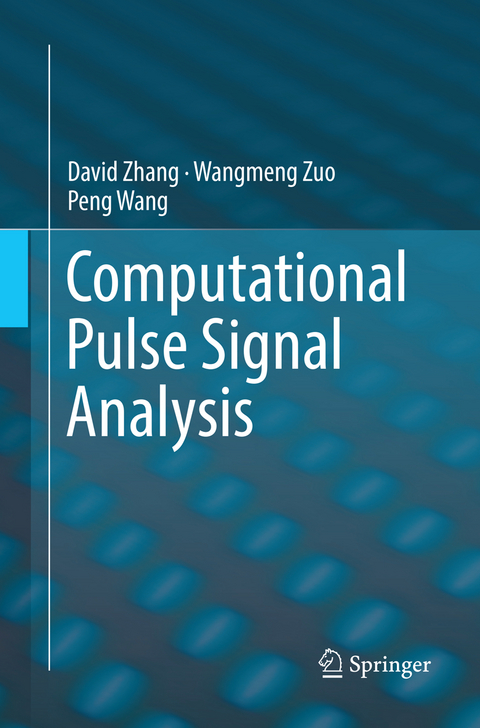
Computational Pulse Signal Analysis
Springer Verlag, Singapore
978-981-13-3835-9 (ISBN)
David Zhang graduated in Computer Science from Peking University. He received his MSc and PhD degrees in Computer Science and Engineering from the Harbin Institute of Technology (HIT) in 1982 and 1985 respectively. From 1986 to 1988 he was a postdoctoral fellow at Tsinghua University and then an associate professor at the Institute of Automation, Chinese Academy of Sciences, Beijing. In 1994 he received his second PhD degree in Electrical and Computer Engineering from the University of Waterloo, Ontario, Canada. Currently, he is a chair professor at the Hong Kong Polytechnic University, where he is the founding director of the Biometrics Research Centre (UGC/CRC), which has been supported by the Hong Kong SAR Government since 1998. He also serves as visiting chair professor at Tsinghua University and HIT, and adjunct professor at Shanghai Jiao Tong University, Peking University, National University of Defense Technology, and University of Waterloo. He has published more than 15books and 400 international journal papers. He was listed as a highly cited researcher in engineering by Thomson Reuters in 2014, 2015 and 2016. Prof. Zhang is a Croucher senior research fellow, distinguished speaker of the IEEE computer society, and a fellow of both the IEEE and the IAPR. Wangmeng Zuo is currently a professor at the School of Computer Science and Technology, Harbin Institute of Technology, Harbin, China. His research interests include discriminative learning, deep learning, image modeling and low-level vision, and biometrics. Dr. Zuo has published more than 50 papers in leading academic journals and at top-tier conferences. Dr. Zuo is an associate editor of the IET Biometrics, guest editor of Neurocomputing, Pattern Recognition, IEEE Transactions on Circuits and Systems for Video Technology, and IEEE Transactions on Neural Networks and Learning Systems. He has co-authored a book on medical biometrics and another book on biometrics. He is asenior member of IEEE. Peng Wang is currently a lecturer at the School of Science, Northeast Agricultural University, Harbin, China. He received his B.S. degree in Information and Computing Science from Harbin Normal University, Harbin, China, in 2007, and the M.S. degree in Computer Science from the Harbin Institute of Technology, Harbin in 2009. From September 2009 to December 2009, he was a research assistant at the Department of Computing, Hong Kong Polytechnic University. His research interests include computerized medical diagnosis, pattern recognition, machine learning, and biometrics. Dr. Wang has published more than 20 papers in leading academic journals and conferences.
1. Introduction: Computational Pulse Diagnosis.- 2. Compound Pressure Signal Acquisition.- 3. Pulse Signal Acquisition Using Multi-Sensors.- 4. Baseline Wander Correction in Pulse Waveforms Using Wavelet-Based Cascaded Adaptive Filter.- 5. Detection of Saturation And Artifact.- 6. Optimized Preprocessing Framework for Wrist Pulse Analysis.- 7. Arrhythmic Pulses Detection.- 8. Spatial and Spectrum Feature Extraction.- 9. Generalized Feature Extraction for Wrist Pulse Analysis: from 1-D Time Series to 2-D Matrix.- 10. Characterization of Inter-Cycle Variations for Wrist Pulse Diagnosis.- 11. Edit Distance for Pulse Diagnosis.- 12. Modified Gaussian Models and Fuzzy C-Means.- 13. Modified Auto-Regressive Models.- 14. Combination of Heterogeneous Features for Wrist Pulse Blood Flow Signal Diagnosis via Multiple Kernel Learning.- 15. Comparison of Three Different Types of Wrist Pulse Signals.- 16. Comparison Between Pulse And Ecg.- 17. Disscusion and Future Work.
| Erscheinungsdatum | 07.05.2019 |
|---|---|
| Zusatzinfo | 110 Illustrations, color; 44 Illustrations, black and white; XIV, 328 p. 154 illus., 110 illus. in color. |
| Verlagsort | Singapore |
| Sprache | englisch |
| Maße | 155 x 235 mm |
| Themenwelt | Informatik ► Theorie / Studium ► Künstliche Intelligenz / Robotik |
| Medizin / Pharmazie | |
| Technik ► Elektrotechnik / Energietechnik | |
| Technik ► Medizintechnik | |
| ISBN-10 | 981-13-3835-3 / 9811338353 |
| ISBN-13 | 978-981-13-3835-9 / 9789811338359 |
| Zustand | Neuware |
| Informationen gemäß Produktsicherheitsverordnung (GPSR) | |
| Haben Sie eine Frage zum Produkt? |
aus dem Bereich


